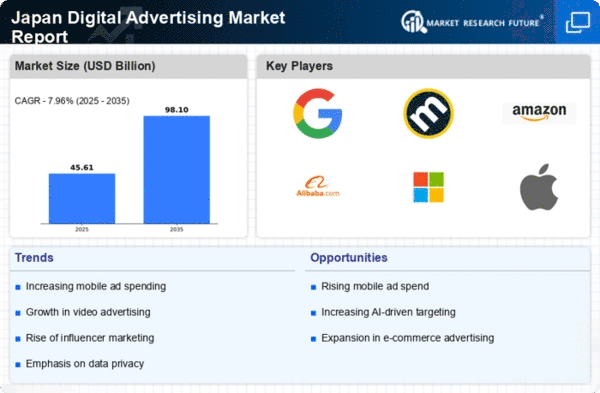Increased Mobile Usage
The surge in mobile device usage in Japan is a pivotal driver for the digital advertising market. As of 2025, mobile internet penetration stands at approximately 95%, indicating that a vast majority of the population accesses online content via smartphones. This trend compels advertisers to optimize their campaigns for mobile platforms, ensuring that advertisements are tailored for smaller screens and touch interfaces. Consequently, mobile advertising expenditures are projected to account for over 60% of total digital ad spending in Japan. The digital advertising market must adapt to this shift by focusing on mobile-friendly formats, such as responsive design and location-based targeting, to effectively engage consumers on their preferred devices.
Evolving Consumer Behavior
Consumer behavior in Japan is undergoing a transformation, significantly impacting the digital advertising market. With an increasing number of consumers conducting online research before making purchases, the importance of digital touchpoints has escalated. Data indicates that around 70% of Japanese consumers utilize social media platforms for product discovery. This shift necessitates that brands enhance their online presence and engage with potential customers through targeted advertising strategies. The digital advertising market must leverage data analytics to understand consumer preferences and tailor campaigns accordingly, ensuring that advertisements resonate with the evolving expectations of Japanese consumers.
Rise of E-commerce Platforms
The rapid growth of e-commerce platforms in Japan is a significant driver for the digital advertising market. With online retail sales projected to reach ¥20 trillion by 2025, brands are increasingly investing in digital advertising to capture the attention of online shoppers. This trend is further fueled by the convenience of online shopping and the proliferation of payment options. Advertisers are focusing on targeted campaigns that drive traffic to e-commerce sites, utilizing strategies such as search engine marketing and social media advertising. The digital advertising market must continue to innovate and adapt to the evolving landscape of e-commerce, ensuring that advertising efforts align with consumer shopping behaviors.
Regulatory Changes and Compliance
Regulatory changes in Japan are influencing the digital advertising market, particularly concerning data privacy and consumer protection. Recent legislation has introduced stricter guidelines on data collection and usage, compelling advertisers to adopt more transparent practices. As a result, companies must invest in compliance measures to avoid potential penalties, which could impact advertising budgets. The digital advertising market is adapting to these changes by prioritizing ethical advertising practices and enhancing consumer trust. This shift may lead to a more sustainable advertising ecosystem, where brands that prioritize compliance and transparency are likely to gain a competitive edge.
Integration of Artificial Intelligence
The integration of artificial intelligence (AI) technologies is reshaping the digital advertising market in Japan. AI-driven tools enable advertisers to analyze vast amounts of data, optimize ad placements, and personalize content for individual users. As of 2025, it is estimated that AI will enhance targeting accuracy by up to 30%, allowing brands to reach their desired audiences more effectively. This technological advancement not only improves campaign performance but also streamlines the advertising process, reducing costs and increasing return on investment. The digital advertising market is likely to see a growing reliance on AI solutions, which could redefine how brands interact with consumers.
















